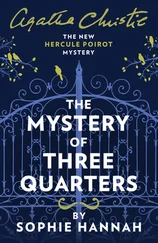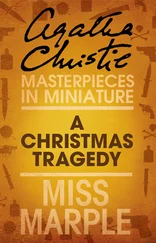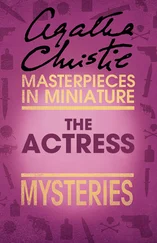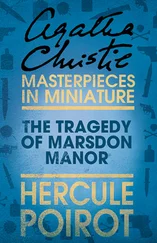Agatha Christie - Three Act Tragedy
Здесь есть возможность читать онлайн «Agatha Christie - Three Act Tragedy» весь текст электронной книги совершенно бесплатно (целиком полную версию без сокращений). В некоторых случаях можно слушать аудио, скачать через торрент в формате fb2 и присутствует краткое содержание. Жанр: Классический детектив, на английском языке. Описание произведения, (предисловие) а так же отзывы посетителей доступны на портале библиотеки ЛибКат.
- Название:Three Act Tragedy
- Автор:
- Жанр:
- Год:неизвестен
- ISBN:нет данных
- Рейтинг книги:4.5 / 5. Голосов: 2
-
Избранное:Добавить в избранное
- Отзывы:
-
Ваша оценка:
- 100
- 1
- 2
- 3
- 4
- 5
Three Act Tragedy: краткое содержание, описание и аннотация
Предлагаем к чтению аннотацию, описание, краткое содержание или предисловие (зависит от того, что написал сам автор книги «Three Act Tragedy»). Если вы не нашли необходимую информацию о книге — напишите в комментариях, мы постараемся отыскать её.
Three Act Tragedy — читать онлайн бесплатно полную книгу (весь текст) целиком
Ниже представлен текст книги, разбитый по страницам. Система сохранения места последней прочитанной страницы, позволяет с удобством читать онлайн бесплатно книгу «Three Act Tragedy», без необходимости каждый раз заново искать на чём Вы остановились. Поставьте закладку, и сможете в любой момент перейти на страницу, на которой закончили чтение.
Интервал:
Закладка:
There was a knock at the door and a page entered with a telegram on a tray.
Poirot opened it. His face changed. He handed the telegram to Sir Charles. Learning over Sir Charlie’s shoulder, Egg read it aloud:
“Please come and see me at once can give you valuable information as to Bartholomew Strange’s death – Margaret Rushbridger.”
“Mrs. de Rushbridger!” cried Sir Charles. “We were right after all. She has got something to do with the case.”
24
At once an excited discussion sprang up. An ABC was produced. It was decided that an early train would be better than going by car.
“At last,” said Sir Charles, “we’re going to get that particular part of the mystery cleared up.”
“What do you think of the mystery is?” asked Egg.
“I can’t imagine. But it can’t fail to throw some light on the Babbington affair. If Tollie got those people together on purpose, as I feel pretty sure he did, then the ‘surprise’ he talked of springing on them had something to do with this Rushbridger woman. I think we can assume that, don’t you, M. Poirot?”
Poirot shook his head in a perplexed manner.
“This telegram complicates the affair,” he murmured. “But we must be quick – extremely quick.”
Mr. Satterthwaite did not see the need for extreme haste, but he agreed politely.
“Certainly, we will go by the first train in the morning. Er – that is to say, is it necessary for us all to go?”
“Sir Charles and I had arranged to go down to Gilling,” said Egg.
“We can postpone that,” said Sir Charles.
“I don’t think we ought to postpone anything,” said Egg. “There is no need for all of us to go to Yorkshire. It’s absurd. Mass formation. M. Poirot and Mr. Satterthwaite go to Yorkshire and Sir Charles and I go to Gilling.”
“I’d rather like to look into this Rushbridger business,” said Sir Charles with a trace of wistfulness. “You see, I – er – talked to the Matron before – got my foot in, so to speak.”
“That’s just why you’d better keep away,” said Egg. “You involved yourself in a lot of lies, and now this Rushbridger woman has come to herself you’ll be exposed as a thorough-paced liar. It’s far far more important that you should come to Gilling. If we want to see Miss Milray’s mother she’ll open out to you much more than she would to anyone else. You’re her daughter’s employer, and she’ll have confidence in you.”
Sir Charles looked into Egg’s glowing, earnest face.
“I’ll come to Gilling,” he said. “I think you’re quite right.”
“I know I’m right,” said Egg.
“In my opinion an excellent arrangement,” said Poirot briskly. “As mademoiselle says, Sir Charles is pre-eminently the person to interview this Mrs. Milray. Who knows, you may learn from her facts of much more importance than those we shall learn in Yorkshire.”
Matters were arranged on this basis, and the following morning Sir Charles picked up Egg in his car at a quarter to ten. Poirot and Mr. Satterthwaite had already left London by train.
It was a lovely crisp morning with just a touch of frost in the air. Egg felt her spirits rising as they turned and twisted through the various short cuts which Sir Charles’s experience had discovered south of the Thames.
At last, however, they were flying smoothly along the Folkestone road. After passing through Maidstone, Sir Charles consulted a map, and they turned off from the main road and were shortly winding through country lanes. It was about a quarter to twelve when they at last reached their objective.
Gilling was a village which the world had left behind. It had an old church, a vicarage, two or three shops, a row of cottages, three or four new council houses and a very attractive village green.
Miss Milray’s mother lived in a tiny house on the other side of the green to the church.
As the car drew up Egg asked:
“Does Miss Milray know you are going to see her mother?”
“Oh, yes. She wrote to prepare the old lady.”
“Do you think that was a good thing?”
“My dear child, why not?”
“Oh, I don’t know… You didn’t bring her down with you, though.”
“As a matter of fact, I thought she might cramp my style. She’s so much more efficient than I am – she’d probably try to prompt me.”
Egg laughed.
Mrs. Milray turned out to be almost ludicrously unlike her daughter. Where Miss Milray was hard, she was soft, where Miss Milray was angular, she was round. Mrs. Milray was an immense dumpling of a woman immovably fixed in an armchair conveniently placed so that she could, from the window, observe all that went on in the world outside.
She seemed pleasurably excited by the arrival of her visitors.
“This is very nice of you, I’m sure, Sir Charles. I’ve heard so much about you from my Violet. (Violet! Singularly incongruous name for Miss Milray.) You don’t know how much she admires you. It’s been almost interesting for her working with you all these years. Won’t you sit down, Miss Lytton Gore? You’ll excuse my not getting up. I’ve lost the use of my limbs for many years now. The Lord’s will, and I don’t complain, and what I say is one can get used to anything. Perhaps you’d like a little refreshment after your drive down?”
Both Sir Charles and Egg disclaimed the need of refreshment, but Mrs. Milray paid no attention. She clapped her hands in an Oriental manner, and tea and biscuits made their appearance. As they nibbled and sipped, Sir Charles came to the object of their visit.
“I expect you’ve heard, Mrs. Milray, all about the tragic death of Mr. Babbington who used to be vicar here?”
The dumpling nodded its head in vigorous assent.
“Yes, indeed. I’ve read all about the exhumation in the paper. And whoever can have poisoned him I can’t imagine. A very nice man, he was, everyone liked him here – and her, too. And their little children and all.”
“It is indeed a great mystery,” said Sir Charles. “We’re all in despair about it. In fact, we wondered if you could possibly throw any light upon the matter.”
“Me? But I haven’t seen the Babbingtons – let me see – it must be over fifteen years.”
“I know, but some of us have the idea that there might be something in the past to account for his death.”
“I’m sure I don’t know what there could be. They led very quiet lives – very badly off, poor things, with all those children.”
Mrs. Milray was willing enough to reminisce, but her reminiscences seemed to shed little light on the problem they had set out to solve.
Sir Charles showed her the enlargement of a snapshot which included the Dacres, also an early portrait of Angela Sutcliffe and a somewhat blurred reproduction of Miss Wills cut from a newspaper. Mrs. Milray surveyed them all with great interest, but with no signs of recognition.
“I can’t say I remember any of them – of course it’s a long time ago. But this is a small place. There’s not much coming and going. The Agnew girls, the doctor’s daughters – they’re all married and out in the world, and our present doctor’s a bachelor – he’s got a new young partner. Then there were the old Miss Cayleys – sat in the big pew – they’re all dead many years back. And the Richardsons – he died and she went to Wales. And the village people, of course. But there’s not much change there. Violet, I expect, could tell you as much as I could. She was a young girl then and often over at the Vicarage.”
Sir Charles tried to envisage Miss Milray as a young girl and failed.
He asked Mrs. Milray if she remembered anyone of the name of Rushbridger, but the name failed to evoke any response.
Читать дальшеИнтервал:
Закладка:
Похожие книги на «Three Act Tragedy»
Представляем Вашему вниманию похожие книги на «Three Act Tragedy» списком для выбора. Мы отобрали схожую по названию и смыслу литературу в надежде предоставить читателям больше вариантов отыскать новые, интересные, ещё непрочитанные произведения.
Обсуждение, отзывы о книге «Three Act Tragedy» и просто собственные мнения читателей. Оставьте ваши комментарии, напишите, что Вы думаете о произведении, его смысле или главных героях. Укажите что конкретно понравилось, а что нет, и почему Вы так считаете.












